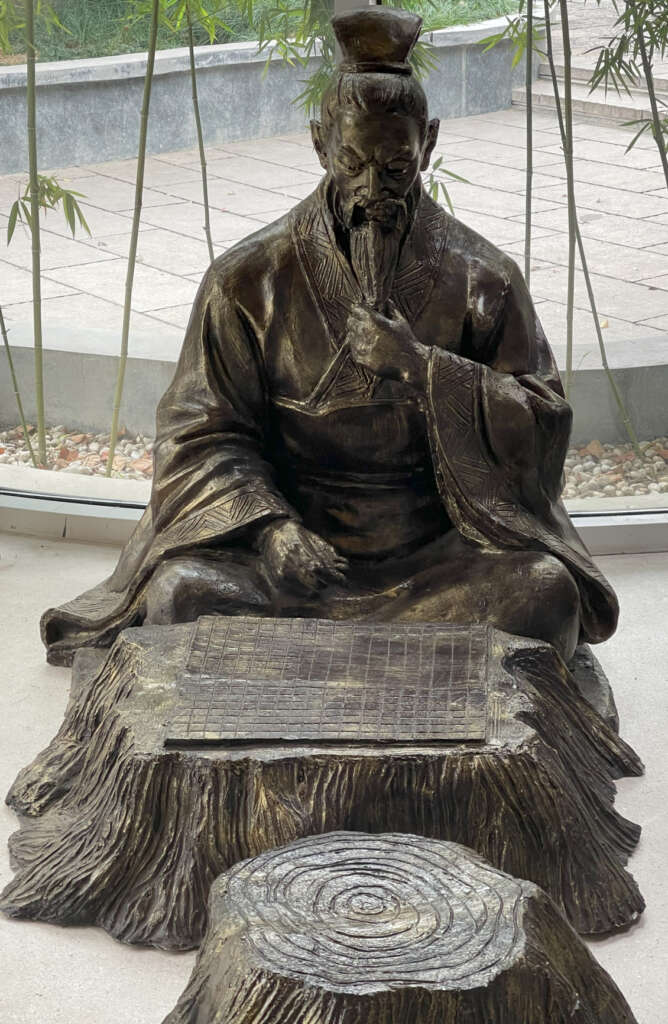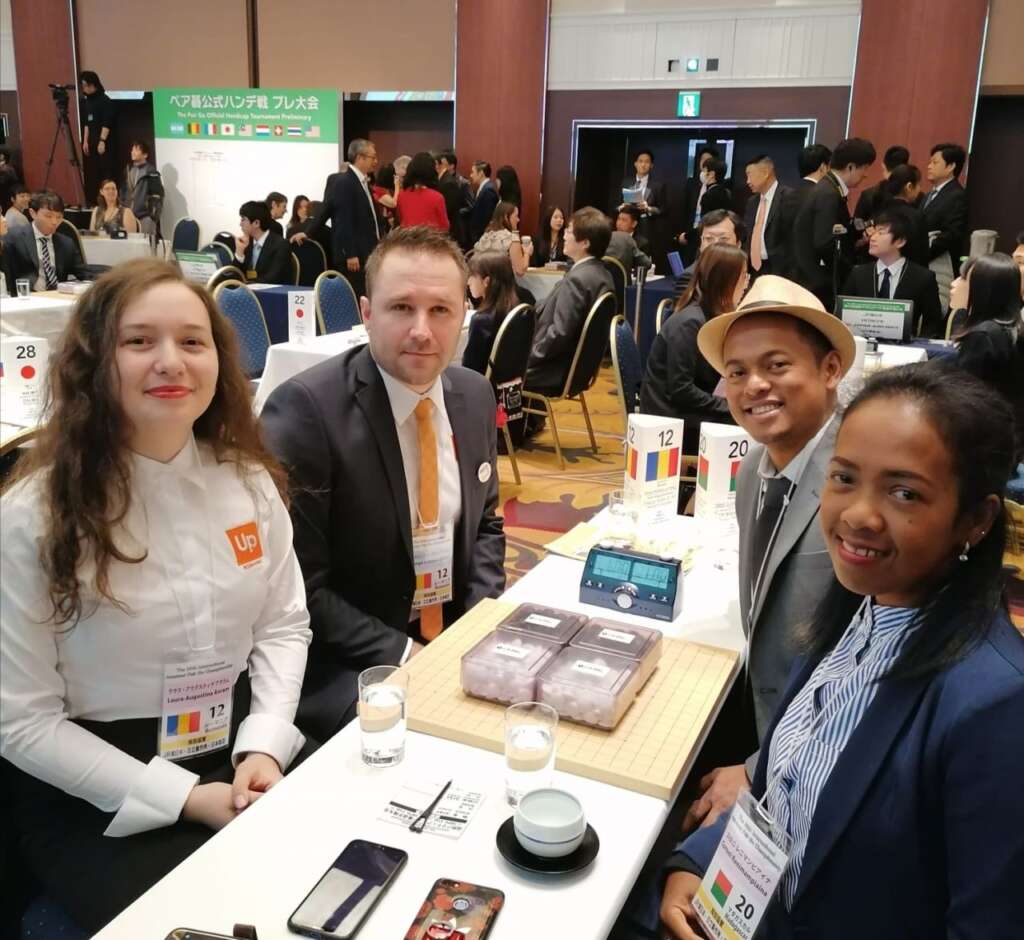THE POPULAR GAME known in China as Weiqi and internationally as Go is the world’s oldest known board game that has been continually played. Legend tracks it back more than four thousand years. If we stick to solid historical evidence, we can see that it was played a still impressive 2,500 years ago.
But what does it tell us about Chinese thinking? Yes, you have to employ strategic thinking and consider holistic factors, but that’s the same with many or most games. What makes it special?

The legend says that Emperor Yao (堯帝) – said to have been born about 2,200 BC – created the game to enlighten his son and transform his demeanor. But historians know almost nothing about this ruler from mythological times, let alone how he passed his spare time.
What we do know is that there is a reference to the game in a book called Zhuo Zhan, written in the fourth century BC.

The game’s rules can be quickly demonstrated and easily grasped. Featuring 19×19 grid lines of 361 intersection points across a board, players take turns to place white or black pieces on the vacant intersection points. The purpose is to surround larger territory while avoiding capture by opponents.

Players have to compete for territories by encircling the pieces put by opponents. When pieces are surrounded by the opposing colour, they will be lifted off the board. Subsequently, a player who gains more territories, which literally means more intersection points, on the board will win the game.
SIMPLE RULES BUT MORE COMPLEXITY
The rules are simple, but the number of permutations of choices is very higher – higher even than chess, another complex classic game.
Another unusual factor is that weiqi is played with a relatively non-confrontational approach, despite the goal being to outplay opponents. In the gameplay, players aim to maximize territories on the board, rather than to crush opponents’ players.
In this way it is unlike chess, where defeating the opponents’ king is the only way to win the game.

In his book “On China” , Henry Kissinger wrote that the Western tradition prized “the decisive clash of forces” whereas the Chinese ideal stressed subtlety and “the patient accumulation of relative advantage”. This profound contrast is demonstrated in chess versus Weiqi, he said.
Despite having been around for thousands of years, it is apparent that Weiqi has no sign of fading away. A survey by the International Go Federation found that there are more than 46 million people worldwide who know how to play Go, of which 20 million play regularly.

In terms of numbers of players, it is mostly played in East Asia, popular in China, Japan and Korea. There are also leagues offering big prizes and grand titles for the best players.
DAUNTING QUEST TO BECOME PROFESSIONAL PLAYERS
The quest to become professional Weiqi players is daunting. In China, professional players have been ranked into nine dans (段) – from first-dan to ninth-dan – based on players’ performance and results in national and international competitions.

Chinese top-notch professional players, including Ding Hao (丁浩), who clinched victory in the LG Cup World Baduk Championship last year, Ke Jie (柯潔) and Gu Zihao (辜梓豪) have ninth-dan level (九段) – the highest rank in Weiqi profession.
To become professional in China, amateur players start learning the game at young age and engage in practice intensively in Weiqi training schools. For amateurs, there are several levels to assess their capabilities. They have to participate in contests staged in different cities and provinces in the country, and get victory in order to get their personal levels higher. The more contests an amateur wins and the higher level is attained.

As a pre-requisite to become professional players, amateurs have to reach amateur fifth-level (業餘5段) while aged below 25. After becoming professional players, they have been regarded as professional athletes and take part in more trainings and contests in more than dozens of national and global contests.
As an official body, the Chinese Weiqi Association (中國圍棋協會) has regularly assessed professional players’ performance and upgrade their dan levels. In fact, only a few number of outstanding amateur players are capable of becoming professional players in China.
CHINESE PRODIGIES RISE TO STARDOM
Today, China’s new-generation players have showcased their master skills and strategic prowess to win medals in various international contests.

Ding Hao, from a humble family in Shanxi’s Datong city (大同市), started learning the game when he was a child. At the age of seven, Ding was arranged to join Weiqi’s training school in Datong by his father. In the beginning, Ding played the board game for fun and later he made swift progress to get the qualification to become a professional player.
At the age of 13, the 23-year-old prodigy joined a Weiqi’s academy in Beijing to undergo intensive training and he successfully became a professional player years later. Ding attributed his success to endless practice and perseverance as he has spent 7-8 hours to practise the game a day.

With his dedication, Ding has been under spotlight after ousting his good friend Yang Dingxin (楊鼎新) to win the LG Cup World Baduk Championship and bag a cash prize of 300 million won (HK$1.74 million) last year. Earlier, Ding won the annual Samsung Cup and several national tournaments, including the Chinese Weiqi Championship and the Weiqi Masters Championship in 2021.
Ding has become Chinese first player born after 2000 to win championships in major competitions.
With a plethora of major international matches and tournaments, Weiqi has remarkably gained popularity in China, Southeast Asia and overseas countries.
Ultimately, Weiqi or Go is a game of calculation – you need to visualize a vast number of possibilities and make moves based on maximizing your chances to advancement against those of your opponent.
It may be that the reputation that East Asians have of being good at math and science may be tracked back to being part of a community which has played this game for at least 25 centuries.
Image at the top shows Croatian players at the European Go Federation.
